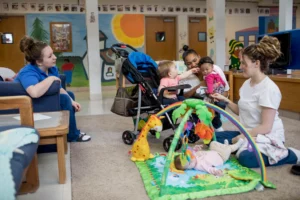
Photo courtesy of Washington Post
Missouri separates incarcerated moms from their babies 24 hours after birth, but new funding from the state means this practice will soon change. Thanks to bipartisan-supported funding, the Department of Corrections is establishing a prison nursery in Missouri at the Vandalia women’s prison, slated to open in January 2025.
The Problem
Abrupt separation of moms and babies so soon after birth inflicts detrimental effects on the child’s social and emotional development. The effects also devastate the mother’s mental and emotional well-being. And the number of mother-baby pairs affected by this kind of separation has only increased over the past three decades: as incarceration of women in the U.S. has increased, so too has an increase in pregnant moms.
A growing international movement aimed at protecting the rights of children of incarcerated parents reflects a notable shift in societal attitudes and practices concerning the treatment of pregnant women in prisons. The United Nations Convention on the Rights of the Child, signed by 97 countries, underscores the importance of implementing federal policies to outline processes to protect the well-being of children of incarcerated parents. Despite these recommendations, the U.S. has yet to enact federal policy to address the growing disparities experienced by incarcerated families.
This means states must step up on their own. In Missouri, this took the form of Senate Bill 834.
The Solution
S.B. 834 introduced funding and programming for the Department of Corrections to establish a prison nursery in Missouri at the Vandalia women’s prison. Prison nurseries allow women who give birth in prison to live with their babies for up to eighteen months. These nursery units within prisons provide a more dedicated environment for women to give birth, care for their infants, and engage in programs such as parenting classes and substance abuse treatment.
This concept traces back to 1902, when the first prison nursery opened in New York. Today, nine additional states, including South Dakota, Indiana, Ohio, Nebraska, Washington, Indiana, and California, have implemented similar programs and seen significant benefits to both mothers and children. Allowing mothers to stay with their infants facilitates crucial bonding and connection, offering families the opportunity to break cycles of trauma and envision a brighter future.
For infants, the opportunity to stay with their mother after birth has been shown to foster more secure attachments, contrasting to the insecure attachments that children may develop growing up without their mothers. Such separations can lead to cognitive and behavioral delays, and potentially manifest into symptoms of depression and anxiety later in their lives.
Research has also shown that mothers participating in the program experience lower rates of recidivism, postpartum depression, and trauma. Mothers participating in prison nursery programs experience a significant decrease in mental health issues, the primary cause of maternal mortality in Missouri. Conversely, mothers who are separated from their children face severe anxiety, postpartum depression, and trauma. Given the high expenses of recidivism, both to the individual and society, the program is economically compelling. Recidivism is the likelihood that an individual will return to the prison system once they have been released. Due to the high cost of incarceration and foster care, building a prison nursery for babies to stay with their mothers saves taxpayers and governments. Further, research suggests that prison nursery programs could yield long term cost savings.
Next Steps
The prison nursery in Missouri program gained broad bipartisan support. Both Democrats and Republicans enthusiastically supported this bill, underscoring the shared humanity that unites us all. As former Representative DeGroot and Senator Trent explained, “there are many compelling reasons to support prison nurseries including improved maternal health, child development, recidivism, and foster care cost savings. We believe babies belong with their mothers. The Missouri Legislature should do everything in its power to promote and preserve healthy families.”
The prison nursery in Vandalia, Missouri is a necessary step towards addressing the challenges faced by incarcerated mothers and their children. It emphasizes family development, understanding, and humanity, and underscores a shift towards rehabilitation in the criminal justice system, rather than retribution. You can learn more about the nursery here and sign up to receive updates on the nursery, slated to open January 2025.
Thanks to Washington University student Ellie Budde for her contributions to this post!






















